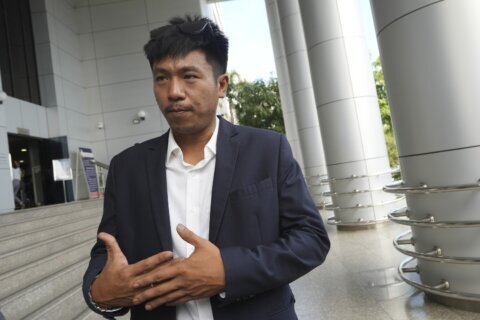NIAMEY, Niger (AP) — Thousands from the junta-led countries in Africa’s Sahel region gathered this week in the Nigerien capital of Niamey, with music and cultural displays, to condemn what they called the West’s imperialist agenda and to drive support for their military regimes.
Delegates from Niger, Burkina Faso and Mali took part in the three-day conference that ended on Thursday. The junta leaders of the three countries are seeking greater popular support after they deposed democratically elected governments and severed ties with longstanding Western partners such as France, their former colonial ruler, with Russia the new preferred partner.
All three nations are nearing the end of their one-year withdrawal process from the West Africa regional bloc known as ECOWAS, which they accuse of being influenced by France in sanctioning them for the coups and of failing to help address the extremist violence rampant across their shared borders.
Conference delegates – including pro-junta youth, women and civil society groups as well as allies from across West Africa and beyond — discussed their countries’ sovereignty as well as economic and security partnerships being forged under the bloc of the three junta-led countries known as the Alliance of Sahel States, or AES.
Major highlights were the three countries’ colors and cultures depicted in the attires and just about everything else as well as music performances and songs, beginning with a pro-junta rendition by Nigerien artiste Idi Sarki, who flashed back to the July 2023 coup in the country.
“Nigeriens, wake up, we don’t want the French army on our land anymore,” sang Sarki, referring to the French troops asked to leave in the wake of the military takeover in Niger and other countries in the region.
“After the colonization, it’s recolonization … We’ll have to intervene one way or another if we want our energy and economic sovereignty — we need raw materials from sub-Saharan Africa,” he sang as the ecstatic crowd chorused and waved flags of the three coup-hit countries.
A women’s music group also performed a song dedicated to African youth.
“After so many years of suffering, the youths rise today in an awakening of conscience for a fight towards hope and freedom,” said the leader performer, wearing with others a white-and-grey traditional gown and scarf.
Since the coups, the militaries in Niger, Mali and Burkina Faso have promised to help address shortcomings that they said inspired them to take over power, such as the deadly violence and economic hardships faced by their citizens.
But the problems have persisted, even worsening in some cases. And in Mali where the junta seized power in 2020, the civilian prime minister appointed by the military was fired on Wednesday after he criticized delays in the election that was to usher in a new government.
Some at the conference, however, expressed optimism that the militaries would deliver long sought-after democratic dividends.
“How can we live under a so-called democracy, when there are no schools?” asked Ali Moussa, who came from the Central African country of Gabon, where a military junta is also in power. “We think that times have changed, it is no longer the time to talk about democracy,” he said.
The campaign for sovereignty and anti-imperialism should also extend to other African countries, said Inem Richardson, who came from Burkina Faso where she runs a pan-African library called the Thomas Sankara Center, named for a Marxist military officer who took power in a 1983 coup.
“All of Africa needs to unite … the masses should be 100% engaged,” Richardson said.
—-
Associated Press journalist Chinedu Asadu in Abuja, Nigeria contributed to this report.
Copyright © 2024 The Associated Press. All rights reserved. This material may not be published, broadcast, written or redistributed.







